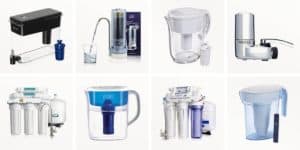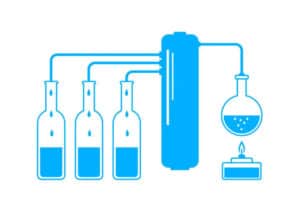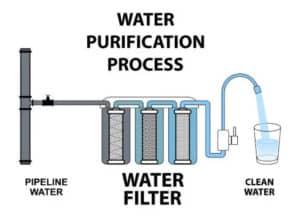We like to share product recommendations with you and hope you like them! Just to make you aware Water Filter Data may collect a small share of sales or other compensation from the links on this page.
We all know that quality water is a basic human right and we can not survive without it. Depending on the region you live in, you probably consume tap water straight from the faucet, take it from the well, or choose a purified or distilled option. If you select one of the last two solutions, the interesting question is, which water is better? In this post, we will review purified vs distilled water?
The water we drink also needs to be free from impurities in order for the people who drink it to be healthy. Water quality is a critical component for many industrial treatment applications.
For instance, boiler water will need to be treated if too many impurities are found in the water.
High amounts of impurities can lead to the development of scale and a worsening of system efficiency, which is why many industrial facilities are required to treat their water on a regular basis.
Most people know that drinking enough water is essential to staying healthy, however, there is sometimes confusion about which type of water is best to drink.
In this article, I explain the differences between purified and distilled water to help you decide which one’s better.
What is Purified Water?
Purified water is water that comes from any source, but has been purified to remove any chemicals or contaminants.
Types of purification include distillation, deionization, reverse osmosis, and carbon filtration.
However, it has its advantages and disadvantages:
Purified VS Distilled Water: Advantages of Purified Water
Its contaminant-free.
Filtration techniques, and especially reverse osmosis, remove up to 99.9% of all total dissolved solids in drinking water, making it almost completely pure.
Do not be concerned about the health implications of drinking water, pure water is far cleaner and safer for drinking than standard tap water.
Remineralization
Many purification units come with a built-in remineralization filter, which adds healthy calcium and magnesium minerals back into the water.
Immediate results
Many purification techniques offer an incredibly speedy process, so drinking purified water is just as easy as turning on your tap.
Purified VS Distilled Water: Disadvantages of Purified Water
Can be costly
If you’re considering purchasing a water filter or reverse osmosis system, keep in mind that you’ll need to factor in costs for regular filter changes in addition to the upfront cost of the system.
Installation
Household water filters are complex by nature, and although most systems are designed for at-home set-up and come partially assembled, there’s still a fair bit of complex installation you’ll be expected to do at the beginning.
The biggest challenge is to connect the unit up to the cold water line underneath your sink or at the point of entry into your house.
If you have little to no plumbing experience, this might take a bit of extra effort.
Removes healthy minerals from water
It’s part of the package of purified water: sometimes the beneficial minerals are removed with the bad impurities, depending on how water is purified.
Requires high water pressure
All households have slightly different water pressures, and if yours is too low, your water filter may not be as efficient.
Uses Of Purified Water
There are a lot of situations when this type of water is crucial. The most common uses are for:
- Autoclaves
- Hand-pieces
- Laser cutting
- Laboratory testing
- Automotive use
- Laboratory use
- Industrial uses
- Pharmaceuticals
In countries that purify public drinking water, various treatment methods are used to make water safe, including:
- Coagulation and flocculation: Positively charged chemicals are added to water to bind with negatively charged particles so they can be filtered out. This forms larger particles called floc.
- Sedimentation: Due to its larger size, floc settles to the bottom of the water supply, separated from the clean water.
- Filtration: The clean water on top of the supply then flows through numerous filtration systems made of sand, charcoal, and gravel. This removes contaminants like dust, bacteria, chemicals, and viruses.
- Disinfection: During this step, chemical disinfectants like chlorine are added to the water to kill any remaining bacteria or viruses that may have survived the first few steps.
How to Purify Your Drinking Water

Most public sources of drinking water are regulated for safety, but some people choose to use home water purifiers to further improve water quality.
Household water treatment units can improve the taste or odor of tap water and remove specific contaminants.
Point-of-use (POU) treatment systems purify only the water that is used for consumption (drinking and cooking). Point-of-entry (PUE) treatment systems typically treat all of the water entering a home.
POU systems are less expensive and therefore more commonly used in households.
These filtration systems attach to the faucet or sit under the sink and also come in free-standing water pitchers with built-in filters.
Most in-home water filtration systems use the following purification techniques:
- Filtration: Filtration systems trap unwanted impurities in the surface or pores of an absorbent medium. Charcoal filters fall into this category.
- Reverse osmosis: These systems use a semipermeable membrane that removes impurities.
- UV light: UV light filtration systems use ultraviolet light to disinfect water by killing potentially harmful bacteria and viruses.
Home water purification systems must be maintained properly. As a result, it’s important to follow the manufacturer’s recommendations for upkeep, including filter replacement, to ensure that your water is being properly purified.
You can find out about the Best Water Softeners 2021 in this article.
What is Distilled Water?

Imply put, distilled water is created through a process known as distillation. In this process, basically, the pure H2O is boiled out of its contaminants.
Many of the contaminants found in water are inorganic minerals and metals, and these contaminants have extremely high melting points with even higher boiling points.
For this reason, as the water (along with its contaminants) is boiled, the pure water is transformed into steam before being captured and cooled, turning into distilled water.
The contaminants are removed, leaving the water essentially purified for drinking. Distilled water contains no bacteria and a very small amount of contaminants.
Purified VS Distilled Water: Advantages of Distilled Water
Completely contaminant-free water
Distillation is highly efficient at the removal of all contaminants from water, vastly reducing your risk of consuming any harmful chemicals.
Lower cost
Compared to other methods of water purification, water distillers are a lot cheaper to buy upfront and don’t require frequent filter changes.
Simple installation
Most distillers come almost completely assembled, and you’ll just need to plug them in, add the filter, switch them on, and they’re ready to go.
Purified VS Distilled Water: Disadvantages of Distilled Water
Lengthy process
The distillation process is by far the longest water filtration process of them all. When water condenses from steam, it does so literally droplet by droplet. This means you’ll need to wait for your storage tank to fill by water drips, which can take several hours.
Consumes a high amount of energy
The water needs to be boiled until there’s nothing left in the boiling chamber (apart from the contaminants), which takes a lot of energy to do.
Removes healthy minerals from water
The water distillation process is so effective, it removes almost all impurities from water – including removing healthy minerals like potassium, calcium, and magnesium. If you like drinking these minerals in your water, you’ll need to find your own means of adding them back in or purchase a remineralization filter.
Requires regular upkeep
With every batch of distilled water produced, a variety of contaminants are left behind in the boiling chamber, which may lead to a build-up of bacteria and other harmful microorganisms.
Calcium and magnesium will also leave limescale deposits on the inside of the boiling chamber, which becomes more difficult to clean the longer you leave it.
Uses of Distilled Water
Distilled water is ideal for when purity is important. Common uses include:
- Medical tools and procedures. Hospitals clean equipment with it to help avoid contamination and infections. Kidney dialysis machines use ultra-pure water to filter waste from the blood.
- Lab tests. Nothing in distilled water reacts with or affects the accuracy of lab experiments.
- Cosmetics. If water is an ingredient in your moisturizer, deodorant, or shampoo, it’s almost always distilled.
- Automobiles. Since it lacks minerals, distilled water won’t corrode metal engine parts or interfere with batteries.
At home, you may want to reach for distilled water for cooking and several other reasons, including:
- Infant formula. Mix it with infant formula if your baby has weak immunity. Otherwise, tap water is fine.
- CPAP machine. Fill the water chamber for a CPAP humidifier if you use it for sleep apnea. Many manufacturers recommend distilled water to make the humidifier last longer.
- Neti pot. Use it with a Neti pot to clear your sinuses.
- Iron. Use it in your clothes iron to prevent scale buildup.
- Shampoo your hair. Fluoride, chlorine, and other additives in the water from your shower may dull your hair.
Risks of Using Distilled Water
Distilled water lacks even electrolytes like potassium and other minerals your body needs. So, you may miss out on a bit of these micronutrients if you drink only the distilled stuff.
Some studies have found a link between drinking water low in calcium and magnesium and tiredness, muscle cramps, weakness, and heart disease.
Also, distilled water may not help you stay hydrated as well as other kinds of water. If you use distilled water for your fish tank, be sure to add a sea minerals supplement to the aquarium.
Some coffee fans think that distilled water makes for a purer-tasting cup. But the Specialty Coffee Association of America says that a certain level of minerals is ideal in order to extract the best brew.
Is Distilled Water Safe to Drink?
Distilled water is safe to drink. But you’ll probably find it flat or bland. That’s because it’s stripped of important minerals like calcium, sodium, and magnesium that give tap water its familiar flavor. What’s left is just hydrogen and oxygen and nothing else.
How to Make Your Own Distilled Water
- Fill a large pot of water halfway.
- Tie a cup to the pot’s lid so the cup will hang right side up inside the pot when the lid is shut. The cup should be high enough inside the pot that it does not touch the water.
- Boil the water for 20 minutes. Boiling creates a vapor that rises and then condenses back into the water.
- The water that drips from the lid into the cup is distilled.
Purified VS Distilled Water: Summary
Both purified and distilled water are very healthy for you and are essentially the same.
The main difference between the two is that purified water doesn’t necessarily get rid of all of the healthy minerals that can be found in water, which isn’t the case with distilled water.
It’s also important to understand that the process of distilling water consumes a significant amount of energy, which means that it’s somewhat harmful to the environment. If you use the reverse osmosis process, you’ll be using much less energy.
When you want the cleanest water that you can find, it’s recommended that you opt for distilled water.
If, however, you want to drink clean water that’s somewhat healthier, you should choose purified water.
Both types of water are healthy for you as long as you maintain a balanced diet. If you’ve been searching for ways to purify your drinking water, you can either distill your water or use the reverse osmosis process, the latter of which takes the water through a semi-permeable membrane.
No matter which option you decide to use, you should be provided with clean and healthy water.

Wayne is a water quality expert – The founder of Water Filter Data. He has a degree in microbiology and his field of expertise is drinking water. His goal is to allow for clean and healthy water for as many people as possible.




